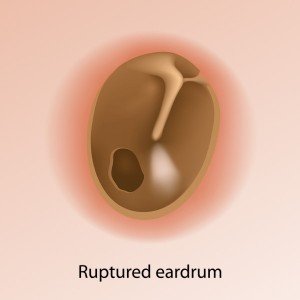Ruptured Eardrum
The eardrum is a small, delicate, oval-shaped membrane that separates the outer ear from the middle ear. This part of the ear serves as a barrier to help stave off infections from spreading to the middle ear from the outer ear. The eardrum is also an integral part of a person’s ability to hear. A hole or rupture in the eardrum is referred to as a tympanic membrane perforation, as the medical term for the eardrum is tympanic membrane. A perforated eardrum is commonly accompanied by a decreased ability to hear, and sometimes a liquid discharge. When the eardrum is perforated, the individual may also experience varying levels of pain. If you are experiencing any of the symptoms listed below, it is important for you to contact your ENT doctor in Arlington, Dallas or Fort Worth. A perforated eardrum can lead to more serious issues or infection, which could result in a loss of hearing or extreme pain.
| Symptoms | The most common symptoms associated with a perforated eardrum are listed below. Symptoms will vary depending on the severity of the tear or rupture.
In some severe cases of eardrum perforation there may be damage to the three bones that are located in the middle of the ear. In these cases, you may experience a dramatic loss of hearing and tinnitus. |
| Causes | The causes of a perforation or tear in the eardrum are usually due to injury, infection, or chronic Eustachian tube disorders. An individual’s eardrum may become perforated from trauma due to one of the following circumstances:
|
| Treatment | A perforated eardrum can be treated by your local ENT doctor, but he will likely perform a hearing test before starting any type of treatment plan. Many types of perforation heal on their own, but it is always important to visit your ENT doctor in Arlington, Dallas or Fort Worth to make sure you do not need a surgical procedure. In some cases, patients may require a tympanoplasty, which is a surgical procedure where tissue is removed from another part of the body and attached to the area of the eardrum that is perforated. This is an outpatient surgery and is usually quite successful in the repair of a perforated eardrum. |

